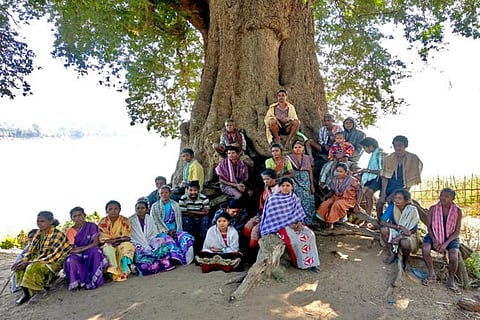

A group of families sit under an ancient tamarind tree at the foot of the Papi Hills in Andhra Pradesh, next to the Godavari River – and the view of the river gently curving into the hills is absolutely stunning.
They belong to the Konda Reddi community, a Scheduled Tribe (ST) in the state, and reside in Sirivaka, a tiny hamlet that houses 60 families with a population below 400.
On that morning, a large number of tourists throng the other side of the river, as they queue up to get on boats to admire the hills and the river. This area will soon be submerged by the Polavaram project, destroying this naturally stunning space.
The families in Srivaka have been asked to vacate their tiny village as it will soon be submerged once the Polavaram project is completed.
Konda Reddi’s fall under the Particularly Vulnerable Tribal Group classification and are scattered in Telangana’s Khammam and Bhadrachalam districts and the twin Godavari districts of Andhra Pradesh.
According to the 2011 Census, Konda Reddis in the East and West Godavari districts have a total population of over 86,000, of which 10% of the people live in West Godavari. Now, three-quarters of the population is concentrated in the areas that will be submerged by the Polavaram project.
The project is likely to affect the livelihoods of at least 3 lakh people, and the Konda Reddis seem the worst affected.
The Polavaram project is likely to submerge a large chunk of history too – the Department of Archaeology recently found terracotta figurines and burial urns in the areas that will soon be plunged underwater.
Understandably, the Konda Reddis are reluctant to leave their hamlets, their farms and their lands behind, having lived here for generations.
Bajari Sanjeeva Reddi, who is in his early 50s, alleges, "Though the proposal was not even accepted by 20% of the people here, our signatures were forged and they used fake thumb impressions to take away our land."
In 2006, the Centre passed the ‘Scheduled Tribes and Other Traditional Forest Dwellers (Recognition of Forest Rights) Act’, which protected the interests of tribal groups and offered them better rates of compensation.
According to the Act, a nuclear tribal family can claim up to 4 acres of land, including land in national parks and sanctuaries if they have been cultivating it for generations.
Despite this law, though, locals say officials didn’t even bother to give them ‘pattas’, which would have given them legal rights over the land they have been cultivating for decades.
Kondla Jeejiya Bai, a 33-year-old woman, says, “Officials have come here many times and did several surveys, but they refused to give us pattas. If they had given them to us, we would not be facing any problems now.”
According to the families sitting under the tamarind tree, officials had valued the houses in the village at Rs 3.40 lakh each, but everyone was yet to get compensation.
Locals say that officials have deliberately ignored them and failed to follow the guidelines prescribed by the 2006 act.
Locals claim that officials are forcefully trying to evict them to Dharbagudem in Jeelugumilli mandal, where land has been allotted to them as compensation for what was taken away from them due to the Polavaram project. However, members of the community still don’t want to claim this land.
Yerram Reddi, a farmer, says, "According to the rules, we should be given land wherever we want. However, officials want us to move to Dharbagudem alone and they have used every unfair trick possible to send us out from here."
"Here, life is safer for us. Even if don’t get work for a day or two, we know which fruits or roots to eat and survive,” Yerram adds.
The locals would much rather be moved to LND Peta (Laxmi Narayana Devi Peta), which lies nearly 15 kms from the Polavaram project.
They say the land there is fertile – for land does provide their sustenance – compared to the soil in Dharbagudem.
A major fear for these locals is that if they get displaced to Dharbagudem, it will affect their status as tribals in a Scheduled V area.
Tribal agency area falls under the purview of the ITDA (Integrated Tribal Development Authority), which works for the socio-economic development and protection of tribes from all forms of exploitation.
The Polavaram Project
The Polavaram project has been controversial from the start. The multipurpose project, with 194 tmc ft, is touted to be a lifeline for the agriculture of the state.
The AP CM, who does a weekly review of the project, recently asked officials to complete the project by May 19.
Polavaram will displace nearly 3 lakh people, out of which 50% are tribals and 15% Dalits, while the remaining are OBCs, all of whom depend on agriculture and the forests for their livelihood.